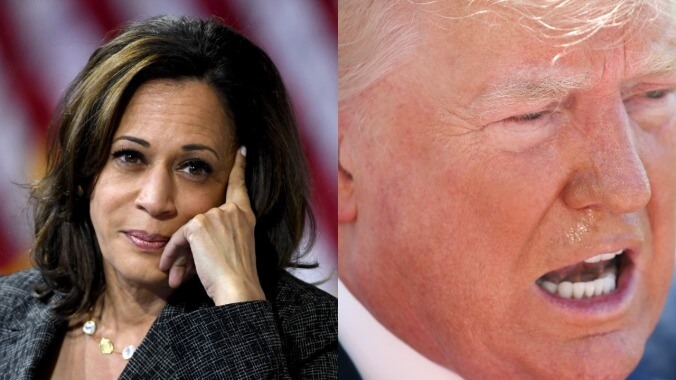Photo: Kamala Harris (Ethan Miller/Getty Images); Donald Trump (Mark Wilson/Getty Images
Last night’s Democratic presidential debate was just a swamp of wasted opportunity. Instead of discussing climate change, housing, or the Hong Kong protests, the candidates wasted another half-hour on healthcare financing and were subjected to a lame-duck final question about whether or not it’s cool to be pals with war criminals. Another fruitless detour was candidate Sen. Kamala Harris pressing candidate Sen. Elizabeth Warren about whether or not Twitter should delete Donald Trump’s account, something that will never, ever ever happen. If it was, it would have happened when he retweeted misleading videos from a noted hate group, posted a racist diatribe about four congresswomen of color, floated a “civil war,” and threatened to drop nukes on North Korea.
It was roughly two weeks ago that Harris again encouraged Twitter to ban his account, saying that his words—specifically, in this instance, the whistleblower who helped expose Trump’s Ukraine dealings—“put people at risk and our democracy in danger.” She doubled down on that front during last night’s debate, saying Twitter allows Trump “to openly intimidate witnesses” and that his tweets are a “matter of safety and corporate accountability.” This is all absolutely true, for the record, but Twitter’s latest update just makes clear what’s been evident since Trump took the presidency—that those in positions of power are playing by very different rules.
Though Twitter claims it would take action against “any account” that, per a blog published on Tuesday, promotes terrorism, directly threatens violence, posts private information, or disseminates child pornography, it also noted that there would be exceptions. Those include when a head of state has “direct interactions” with other “public figures” or when they engage in “foreign policy saber rattling on economic and military issues,” which, it says, aren’t violations of its rules. Additionally, the company says, “We focus on the language of reported Tweets and do not attempt to determine all potential interpretations of the content or its intent.”
Should a world leader break these rules, they could see a “warning notice” put in front of an offending tweet—this rule has been in play since June, but many feel it hasn’t been properly enforced against a number of Trump’s more incendiary tweets. In the future, Twitter could also disallow offending posts from being retweeted or liked.
“With critical elections and shifting political dynamics around the world, we recognize that we’re operating in an increasingly complex and polarized political culture,” reads the statement. “These are constantly evolving challenges and we’ll keep our policies and approach under advisement, particularly as we learn more about the relationship between tweets from world leaders and the potential for offline harm.”
Since it’s very unlikely that Twitter would ever actually enforce these rules against Trump, it’s probably best to look at things the way Warren does. In response to Harris, she said, “Look, I don’t just want to push Donald Trump off Twitter. I want to push him out of the White House. That’s our job.”










![Rob Reiner's son booked for murder amid homicide investigation [Updated]](https://img.pastemagazine.com/wp-content/avuploads/2025/12/15131025/MixCollage-15-Dec-2025-01-10-PM-9121.jpg)

























![HBO teases new Euphoria, Larry David, and much more in 2026 sizzle reel [Updated]](https://img.pastemagazine.com/wp-content/avuploads/2025/12/12100344/MixCollage-12-Dec-2025-09-56-AM-9137.jpg)




